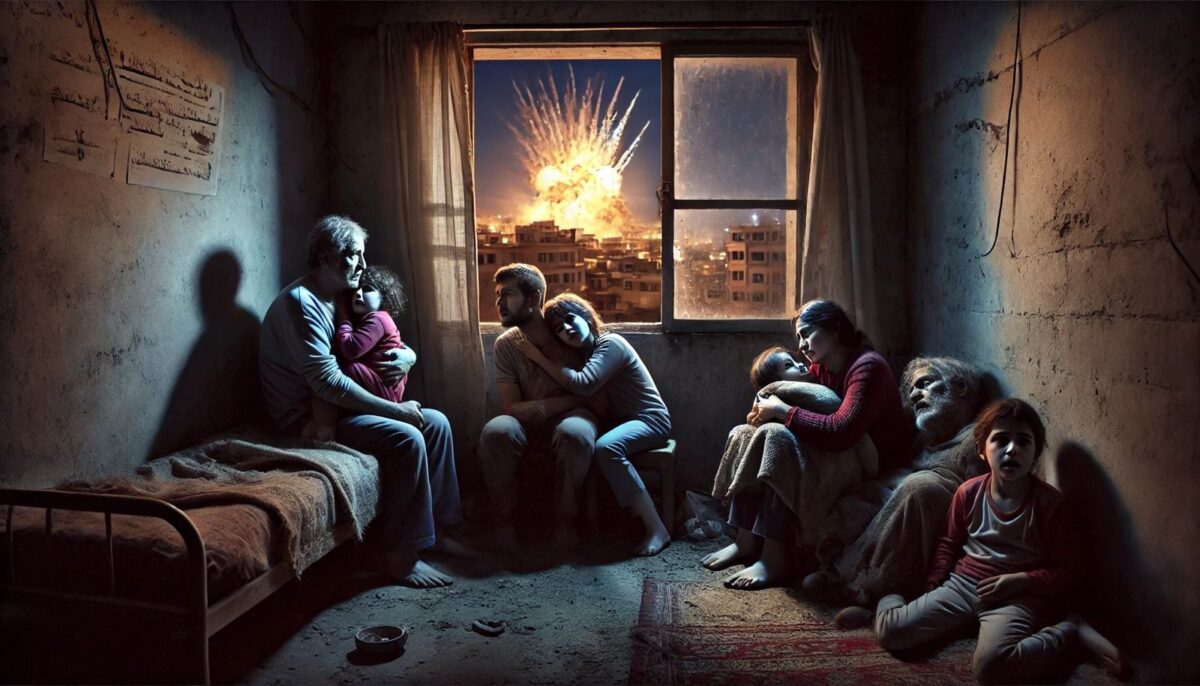
Lebanon was already in the middle of a mental health crisis. Now the war is adding another layer of acute trauma to an already vulnerable population that has endured multiple challenges over the past five years, making the demand for psychiatric support overwhelming
The ongoing war in Lebanon is severely impacting the mental health of people across the country, intensifying the emotional toll already caused by years of economic crisis and instability. Constant bombings, drone activity, and the threat of violence have created an atmosphere of fear and anxiety, leaving many feeling unsafe in their own homes. Many are left struggling with symptoms of trauma, anxiety, and grief, with little support to help them cope.
According to experts in the field, people have been suffering silently for years, especially during the multiple crises Lebanon has faced since 2019, now many are coming forward to seek help and many for the first time. The most common issues that these experts are seeing include anxiety and depressive disorders.
“When you have to worry about whether you and your family will survive the night, mental health cannot be your primary focus. People are consumed by survival mode.” Said Dr. Myriam Zarzour, Psychiatrist and Co-Director of the Embrace Community Mental Health Center to NOW.
According to Dr. Myriam, the organisation is seeing high levels of anger, sadness and fear whilst most people are reporting significant sleep disturbances and changes in appetite.
She also explained that many who already had pre-existing mental health conditions, who were stabilised over the years, are now seeing a dramatic worsening of their symptoms due to the overwhelming stress.
The widespread privatisation in Lebanon has made mental health support inaccessible for many, as the high cost of services places them out of reach for most, especially with rising poverty rates and the added financial strain from the ongoing war. This has intensified the demand for organisations offering free services, as more people rely on them for crucial mental health support.
“Even before the war, demand was incredibly high, and our resources have never fully met it. Since the launch of the Embrace Community Mental Health Center in August 2020, we’ve had to prioritise cases based on urgency, meaning some people have been waiting months to start therapy, even before the recent events,” said Dr. Myriam.
The situation is particularly hard on vulnerable groups, including children, who are witnessing traumatic events that could have long-term psychological effects.
According to Jad Daou who is the Project Coordinator for Mental Health for Youth And Adolescents at Embrace, the psychological impact of the war on children has been devastating. Many children are experiencing intense fear and anxiety. This has been seen through the difficulty a lot of them are having with sleep, with some even suffering from nightmares related to the traumatic events they’ve witnessed in recent weeks.
Additionally, Jad explained that some children are showing signs of hypervigilance, always feeling on alert and worried that something bad will happen. Some are also exhibiting emotional withdrawal and sadness, becoming less talkative and socially isolated.
The team are actively working on the ground in several shelters, providing psychological first aid and psychosocial support to these children.
“Through direct conversations, listening, and providing them with emotional support, we aim to create a sense of safety and comfort. We are also engaging them in activities that promote connection and interaction with their peers, helping them rebuild trust and resilience during these incredibly challenging times,” explained Jad.
While the immediate acute stress symptoms in most individuals are clear, including insomnia, hypervigilance, excessive fear, irritability, the long-term impact will be catastrophic. This ongoing trauma isn’t something you just “recover” from. It will leave deep scars, not just mentally but also physically, as we know that prolonged exposure to stress worsens overall health.
The war is also particularly distressing for Lebanon’s older generation, many of whom have already lived through previous wars and are now facing renewed trauma. For them, the resurgence of violence stirs painful memories of past wars, triggering feelings of fear, helplessness, and emotional exhaustion.
Displacement and the need to shelter far from home are also deeply impacting the mental health of many in Lebanon as being uprooted from their homes disrupts people’s sense of safety and stability, leaving them feeling disoriented and vulnerable.
“We are facing the strain of over crowdedness whilst being in an unfamiliar environment, the lack of privacy and personal space heightens the anxiety and stress, and it is also the uncertainty of when or if we will return home which is automatically intensifying feelings of grief and loss,” said Batoul Assad, a 22-year-old maths student, sheltering at a school in Beqaa.
Patricia Abi-Aad, National Lifeline Manager at Embrace told NOW: “Additionally, many express a profound sense of thwarted belongingness, struggling with feelings of isolation, disconnection from their communities, and a lack of meaningful social support during these times.”
The loud sound of bombings and sudden sonic booms from Israeli jets in Lebanon is also deeply impacting the mental health of individuals as it is instilling a sense of fear and unease whilst triggering panic, hypervigilance and anxiety, particularly among those who have experienced trauma from previous wars.
For many, the relentless noise serves as a harsh reminder of their lack of safety and control, increasing feelings of helplessness, making it difficult to manage daily life as they are continuously being exposed to stressors which can lead to long-term psychological effects, including post-traumatic stress disorder (PTSD) and chronic anxiety.
Ismail, a Syrian refugee in Lebanon, who fled from Khiam in south Lebanon and is now displaced in Beirut told NOW: “It feels like the war never truly ended for us. We fled the horrors of Syria, hoping to find safety here, but now we’re trapped in another conflict, displaced again, with the sound of bombings constantly shaking our mornings and nights.”
Rodayna Raydan is a Lebanese-British journalist. You can follow her on Twitter @Rodayna_462
The views in this story reflect those of the author alone and do not necessarily reflect the beliefs of NOW.








